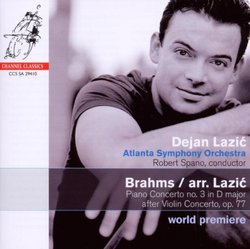Interesting but certainly no substitute for the Vln. Cto.
B. Guerrero | 03/20/2010
(5 out of 5 stars)
"Yes, I know - perhaps I shouldn't award this 5 stars. But my reasoning is as follows: this is THE premiere recording of such a transcription, and the Channel Classics sonics are superb. In fact, I was totally blown away to hear applause at the end of the performance - it sounds better than many "studio" recordings. As for Lazic's actual transcription, I'll allow classical piano experts to take the microphone. I'm no expert at piano literature (and I'm sure you'll have no problem in believing that). Now I'll give you my subjective "feelings" about this endeavor.
I think that this is in no way a substitute for the violin concerto (and I'm sure Lazic has no such aims). Yet, I prefer this to the two existing piano concertos from Brahms, simply because it's shorter and more tightly constructed than the second concerto, while the musical content strikes me as more mature and developed than it is with the earlier Op. 15 concerto. In other words, it think it's a better piece of music, regardless of what instrument takes the solo (comes from jazz background, sorry). I KNOW, I KNOW - begin lobbing your blog grenades now! You can call me jaded, as I've pretty much lost my appetite for the two piano concertos from Brahms. Whatever - I feel your anger. So here's the final low-down.
At Channel Classics prices, buy this only if, A). you're truly curious, B). you're a huge maven of classical piano literature, or C). you're a Brahms "complete-ist". One thing won't disappoint, and that's the sonics from C.C. This also includes perfectly serviceable readings of the 2 Rhapsodies, Op. 79, as well as the Scherzo in E-flat minor, Op. 4."
What would Mr. Brahms think?
Classical Curiosities | Canton, OH, USA | 05/14/2010
(3 out of 5 stars)
"As much as I like concert music, I am particularly fond of Classical oddities, like Schubert's "Unfinished" in a finished version, and more to the point, Beethoven's Piano version of his Violin Concerto. In fact, the latter is referred to in the program notes to this CD as a kind of justification for Lazic's pianofication of Brahms' Violin Concerto. The big questions for me were, "does it really work? Does it really satisfy?" The recording and performance are quite good, and the piano interpretation is often surprising, generally parallel to the violin part (fleshed out with additional material for two hands), but often Lazic takes off into virtuoso flourishes which Brahms (dead though he may be) would not recognize nor would he approve. But frankly, who cares? It is a novelty item worthy of a few hearings, and a wonderful "trick" device to a visitor who thinks he knows everything about Classical music. In that sense, I've had a ball with it two or three times already! And if you like this work, you've got to purchase--like right now--Schonberg's orchestration of the Brahms Piano Quartet Op. 25 on Chandos conducted by Neeme Jarvi."
A missed opportunity, unfortunately
Santa Fe Listener | Santa Fe, NM USA | 05/13/2010
(2 out of 5 stars)
"In the 19th century everything was transcribed, and alternations that might seem appalling in the abstract (e.g., adding Lisztian fireworks to Schubert songs) turn out to have a charm all their own. It helps, of course, if the transcriber is the composer himself, but that's no guarantee -- Beethoven's piano version of his violin concerto feels thin and underdone. I wanted Dejan Lazic to really let himself go here, but he hasn't. The characteristic Brahms piano sound isn't hard to fathom. It's full of octaves, thunderous oratory, deep passion, and thick textures constructed from big bass chords overlaid with virtuosic passagework. A clever imitator should have no problem, especially once he has the template of Brahms's magnificent orchestral accompaniment already at hand.
As it happens, Lazic moves in the wrong direction most of the time, thinning out the texture, adding little more than a few fifths and thirds to the solo violin line while relying too much on octave doubling. Much of the time he sounds like he's filling in the orchestral accompaniment. Rarely does he attempt a melodic variation, which is fine if your aim is to achieve fidelity to the original. But true fidelity is impossible using the piano, therefore, why not exploit virtuosity to the fullest? Liszt would have gone medieval, I imagine. the problem here isn't that the piano sounds wrong but that it sounds timid."


 Track Listings (7) - Disc #1
Track Listings (7) - Disc #1